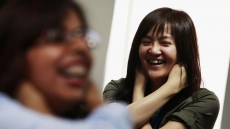South Asians in US are more prone to heart attacks and diabetes when compared to other ethnic groups, it was highlighted at a health congress here.
The American Association of Physicians of Indian Origin (AAPI) has highlighted various preventive healthcare initiatives at the First World Congress on Preventive Healthcare 2015 in Houston, Texas.
Aimed at creating global awareness about preventive healthcare, the three-day Congress held July 10-12 was part of the North American Bengali Conference (NABC) 2015, organized by Tagore Society of Houston.
The Congress highlighted that one American dies every 40 seconds in the US from cardiovascular diseases. A disproportionate burden of this risk is seen in the 3.4 million South Asians who live in the US.
The risks for heart attacks and cardiovascular death can be up to five times higher for South Asians when compared to other ethnic groups.
The total number of people with diabetes is projected to rise from 171 million in 2000 to 366 million in 2030.
In 2012, 29.1 million Americans, or 9.3 percent of the population, had diabetes and 13 percent of Asian Indians had diabetes.
While South Asians have a one in three lifetime risk for developing diabetes, total costs of diagnosed diabetes in the US in 2012 were $245 billion.
Dr. Sumita Chowdhury, chairperson for the Congress, appealed to the South Asian community to help conquer the epidemics of cardiovascular diseases and diabetes by joining the the South Asian Cardiovascular Registry.
Bringing together all stakeholders in healthcare to formulate a shared vision towards prevention of disease, the Congress was intended to create sustainable measures for prevention that can be adapted worldwide and integrated into the fabric of life.

The forum was a way to evaluate the factors contributing to the increased disease risk among South Asians and help to formulate awareness campaigns to help modify risk factors that are specific to this ethnic group.
AAPI President Dr Seema Jain, highlighted various initiatives taken by the largest ethnic association of medical professionals in the US, in America and in India for preventing health risks and bringing the best healthcare to millions of people.
An estimated 1.2 million physicians of Indian origin working around the world have made enormous contributions to the world of healthcare, she said.
Jain pointed out that Indian-Americans constitute less than one percent of the population in the US, but they account for nearly nine percent of the physicians in the country.
Serving in almost all parts of America, they are estimated to provide healthcare to over 40 million patients in the US, she said.





